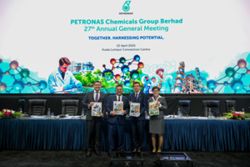KUALA LUMPUR: The race to net-zero emissions requires Malaysia to fast-track its environmental laws and formulate more climate financing strategies, says Rafizi Ramli.
The Economy Minister said that although the country contributes less than 1% of global emissions, there is an urgent need to “punch above our weight and be an environmental steward for net zero”.
He said this when launching the International Greentech and Eco Products Exhibition and Conference Malaysia (IGEM) 2024 day at the Kuala Lumpur Convention Centre yesterday.
Also attended by Natural Resources and Environmental Sustainability Minister Nik Nazmi Nik Ahmad, the theme of the 15th edition of IGEM this year is “Race Towards Net Zero: Regional Leadership for Climate Urgency”, with 48 countries taking part in the exhibition.
“We recognise not just the social impetus but the need to demonstrate regional leadership,” said Rafizi.
He said to achieve this, the government must address the energy trilemma: establishing security, sustainability, and affordability.
“For example, we may be the fifth largest exporter of LNG (liquefied natural gas) in the world, but we are importing about 30% to fuel our own electricity needs. This poses a serious question about our foreign dependence,” said Rafizi.
To counter the foreign dependence, he said there can be government policies such as a green tax or building the right kind of renewable energy infrastructure.
He said Malaysia’s biodiversity combined with its position as the third-largest manufacturer of solar panels and second-largest producer of palm oil makes it easier to embrace biomass as an alternative fuel source.
Rafizi also said fast-tracking legislation was important to ensure best practices can be put in place.“If you look at the Carbon Capture Utilisation and Storage (CCUS) Progressive Regulatory Framework, Malaysia is blessed with several high-quality storage sites. “Next month, this administration will be tabling a CCUS Bill in Parliament, demonstrating that Malaysia can marry both policy and natural resources towards net zero,” said Rafizi.
Nik Nazmi, in his welcoming speech, said Malaysia’s recent intensifying temperature change forces a need for transformation.
“In February and March, Malaysia faced a troubling surge in extreme heat. The Malaysian Meteorological Department issued nearly 45 heatwave warnings from January to September, underscoring the intensifying temperature crisis.
“The impact on agriculture has been severe, with the Malaysian Agricultural Research and Development Institute estimating that this year’s rice yield may fall to only 62% of last year’s figures.
“Addressing these challenges demands the mobilisation of resources, strategic investments, and collaborative efforts.
“To energise these initiatives, we are committed to fast-tracking new legislation like the National Climate Change Bill which will facilitate our progress towards achieving climate goals.
“The National Climate Change Action Council has enforced a national target of achieving net-zero emissions by 2050. This goal is rooted in the outcomes of the Nationally Determined Contributions Roadmap and Action Plan alongside the Long-Term Low Emission Development Strategies,” added Nik Nazmi.







































